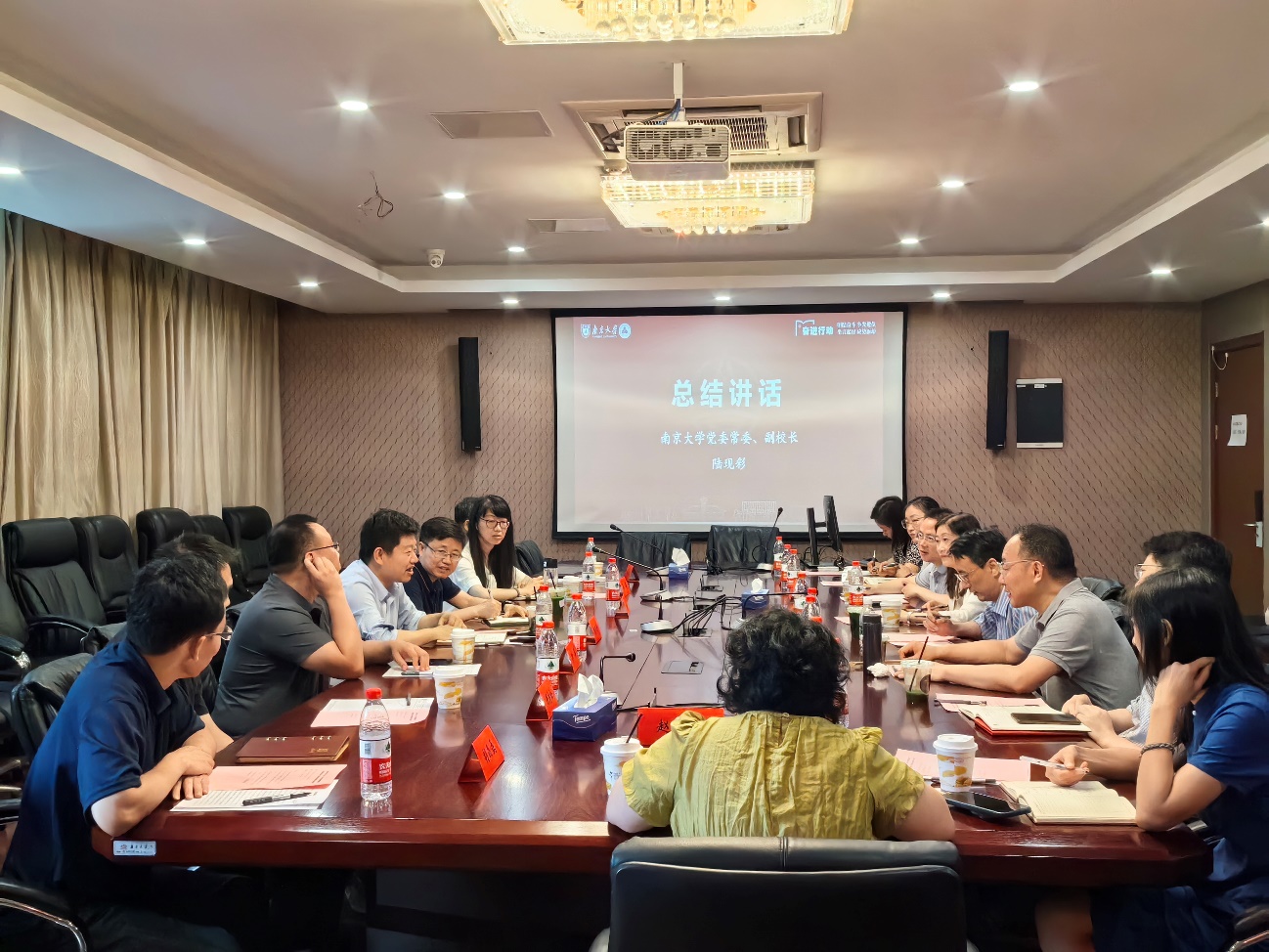On the morning of June 21, the Party Committees of Kuang Yaming Honors School and the School of Mathematics co-hosted a themed Party Day activity titled “Forging Ahead to Cultivate First-Class Talent, Upholding Discipline and Improving Management Efficiency.” Lu Xian Cai, a member of Nanjing University’s Party Standing Committee and Vice President, attended the event. Liu Gongxiang, Party Secretary of the School of Mathematics, Zhou Yuan, Party Secretary of Kuang Yaming Honors School, Xu Wang, Advisor to the Teaching Committee of Kuang Yaming Honors School, as well as the Party and administrative leaders of the two schools, and teacher Party member representatives attended the event. The activity was chaired by Wang Jun, Executive Vice Dean of the Undergraduate School, Executive Dean of the College of First-Year Students, and Dean of Kuang Yaming Honors School.
Lu Xian Cai expressed that the Party Committees of Kuang Yaming Honors School and the School of Mathematics had deeply integrated Party discipline education with business development. This not only demonstrated a pioneering spirit but also showed a strong commitment to continuous exploration. He hoped that the two Party Committees would engage in further collaboration through more diverse formats, exploring areas such as honor course construction, faculty recruitment, and institutional security systems to provide customized solutions for cultivating top-tier innovative talents at Nanjing University, and to continue making progress in implementing the “Forging Ahead Initiative”.

Zhou Yuan introduced the measures and outcomes of Kuang Yaming Honors School’s Party Committee in implementing the “Forging Ahead Initiative”. She mentioned that the school Party Committee leads development with high-quality party building, takes adopting the spirit of scientists to assist in the cultivation of top innovative talents as its work approach, standardizes the construction of party branches, and gathers cohesive force. By organizing special party classes titled “Forge Ahead to Embark on a New Journey,” it guides students to strive for excellence in scientific and innovative activities such as the Basic Science Forum. In the future, the school will also focus on national strategies and Nanjing University's requirements, striving for innovative breakthroughs in the cultivation model of top innovative talents.
Liu Gongxiang introduced the measures taken by the School of Mathematics’ Party Committee in strengthening Party discipline education and advancing high-quality integration of Party building and academic work. He emphasized that the School of Mathematics Party Committee has enhanced the effectiveness of educational activities by inviting theoretical experts to give Party lectures and establishing collaborative efforts with external research institutions such as the Provincial Academy of Agricultural Sciences. In the future, the Party Committee will further utilize its political functions to attract and cultivate more talents, contributing to the cultivation of top-tier innovative talents at Nanjing University by leveraging the educational strength of foundational disciplines.
Wu Ting, Vice Dean of the School of Mathematics, introduced the curriculum construction of the School of Mathematics. She emphasized that the School of Mathematics will provide the best possible support for the development of mathematics courses across the university, serving the talent cultivation and educational needs of all disciplines.
Dong Hao, Vice Dean of Kuang Yaming Honors School, introduced the school’s talent cultivation initiatives. He noted that the school provides more pathways for the growth of top-tier innovative talents by setting up research mentors and adopting tiered small class teaching. Hu Jinglei, Secretary of the Teaching Staff Party Branch at Kuang Yaming Honors School, introduced
the situation of the ideological and political education of the school curriculum and the party-building of the faculty branch. He mentioned that as a teacher Party member, he would lead the staff Party members in discussing the connotations of ideological and political education in the curriculum and optimizing teaching models, while also strengthening the construction of teacher ethics, building a strong ideological defense, and upholding discipline to assist the university and school in cultivating top-tier innovative talents.
At the meeting, Party member representatives from both schools engaged in in-depth discussions on topics such as Party discipline learning, improving management quality, and talent cultivation, working together to build a new model of collaboration between the schools and collaborative fostering of talents.


